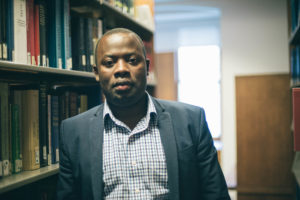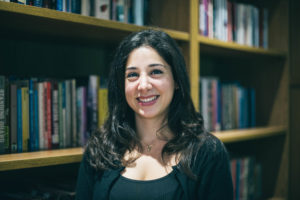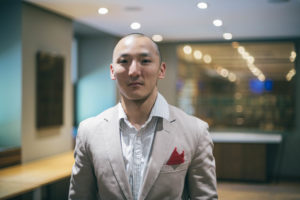The Trudeau Centre for Peace, Conflict and Justice Fellowship is for Political Science doctoral students at the University of Toronto who are conducting research in areas related to peace, conflict and justice. The recipients of this award become fellows of the Centre and have the opportunity to participate in its academic life.
I had the opportunity to sit down with the three PCJ Fellows for 2018-2019 and speak to them about their research, why they chose to pursue their fields of interest, and what advice they would give to undergraduate students currently studying in the Peace, Conflict and Justice program.
Gerald Barebbe
Gerald is a PhD candidate studying how to reconstruct states and society after a civil war, with a focus on the cases of Uganda after the 1986 war and Rwanda after the 1994 genocide. He is particularly interested in how states attempt to rebuild themselves and how the interests of the military and elites converge in the aftermath of conflict. Particularly, he tries to pin down what is necessary to create states that are durable and governments that benefit society more broadly.
Gerald completed his undergraduate studies at Makerere University, Uganda, as well as his Master’s degree in International Relations. He also holds an Advanced Master’s Degree in Governance and Development from the University of Antwerp. His other fields of study include comparative politics and comparative political economy, particularly in the context of Sub-Saharan Africa.
A native of Uganda himself, Gerald grew up close to the Uganda-Rwanda border and has relatives in both countries. Before shifting to academia, he worked as a journalist in the region for several years, covering the civil war in South Sudan and conflicts in Eastern Congo and Somalia. He integrates these experiences in his research today, delving deeper into the causes and effects of the case studies he experienced first-hand.
Gerald chose to apply to be a PCJ Fellow to become a part of a community of scholars that are concerned with building durable peace and interested in the ways in which we can rebuild societies. His advice for current PCJ students is to “meet, associate and interact with your course instructors and TAs as much as possible. They are there to help you with issues such as course selection, and how to effectively comprehend complex theories.”
Valérie Kindarji
Valérie is a PhD student who is interested in studying the roles of third-party interventions in conflicts, specifically looking at NATO and Russia. Her master’s thesis focused on Canada’s intervention in Libya, but not in Syria, and the reasons and motivations behind this. More specifically, she inquires into what happens when these parties intervene: Does it affect the duration of the conflict? Its intensity?
While there is a breadth of literature on why larger powers intervene, middle powers such as Canada are understudied—which is another reason why Val focuses so much on this topic. She does this by studying middle powers’ foreign policies and in which conflicts they choose to intervene, and the risks and rewards involved in decision-making.
When asked about what drives her studies, Val described how she is a pacifist at heart; in fact, her fellow students in Master’s seminars used to call her The Optimist. However, she wanted to change her belief that peace was always possible as long as we could determine why conflicts occur, and that conflicts were simple in that sense.
More personally, Val’s parents were born and raised in Lebanon and had to flee the civil conflict there and come to Canada. She grew up hearing stories of war and conflict, and juxtaposed the ease of living in Canada as a place free of immediate danger to her parents’ stories.
She knew from the beginning of her time at U of T that she wanted to be a part of the Munk School, and becoming a PCJ Fellow was a great way to do so. She is excited to meet others through this network that study similar topics, and who can give ideas and feedback on each other’s research. Her advice to current PCJ students is to truly absorb the readings. It’s easy to get lost in just trying to learn what you need for the exam, but when you begin to “really internalize what you’re reading and remind yourself that you’re actually interested in the topic.” This helps not only learn the material, but integrate it across classes and map connections, which is so much more rewarding. Finally, she says, “Remind yourself of how lucky you are. Sometimes when you’re overwhelmed with exams you forget how lucky you are to learn these things that are interesting to you.” And if they aren’t? Switch programs—it’s not worth your time otherwise.
Cheng Xu
Cheng’s major research interests include peace-building and conflict, particularly in instances of insurgency and counter-insurgency. His area of focus for his PhD research is the Philippines, which presents an interesting case study and poses important questions, including why some insurgencies become fragmented while others do not. Furthermore, he asks: With all the risks involved, what drives someone or a group of people to fight, to take up arms? He believes answering this question brings us closer to addressing the root causes of conflicts.
Cheng draws on 10 years of experience in the Canadian Armed Forces. While he wasn’t involved in any counter-insurgency efforts himself, he describes others recounting experiences in counter-insurgency movements, such as in Afghanistan. He realized during his service that there are very different mindsets within the military between counter-insurgency and conventional warfare; the approach to conventional warfare would not be conducive to counter-insurgency, and would actually make situations worse.
His studies are driven by a desire to delve deeper into the understanding of conflicts he had experienced first- or second-hand. Beyond his service in the military, Cheng describes how he and his mother came to Canada from China when he was nine years old as political refugees to escape political persecution. His mother made sure growing up that they never took for granted the rights and liberties they enjoyed in Canada, and to never forget the importance of service.
A question that stayed with Chen amidst all of this was, “What were the conditions that drove my mother and I from my homeland?”—a question, Cheng describes, that became very salient when thinking of people’s lives in other parts of the world, where states can repress people and this cost of human suffering. In studying these cases and trying to get closer to identifying the root causes of conflict, he hopes that the conditions that drove him and his mother from their homeland could then be eliminated for others in similar or worse situations.
Cheng has known since his introduction to U of T the level of scholarship that a Munk institution produces, and the breadth of resources it has to make this possible. When Dr. Jacques Bertrand described to him the insight development at Munk and PCJ, he knew it would be the perfect opportunity. He anticipates that the fellowship will allow him to discuss with others that attempt to address the same questions as him through different perspectives, but with the shared goal of excellent research. Chen argues that synergizing these diverse insights produces a larger, more accurate view of the world around us, and raises the bar yet higher for the level of scholarship generated through the Munk School.
His advice to current students in the PCJ undergraduate program is the same advice that his supervisor, Dr. Lee Ann Fuji, gave to him shortly before she passed away: “Let your intellectual curiosity guide you where it needs to go.” In other words, he says, “Find the thing you love, the thing you’re most interested in and just dive deep into it Don’t go pursuing something because somebody tells you that it’ll get you a job or that people will care about it more; no, find the thing you care and are more curious about—whether a region, a concept, an event, a timeline—and just focus on that. And be a very hungry learner—strive to learn everything about it. Once you have that passion, nothing will feel like work; it’ll just feel like you’re just fulfilling that part of you that you’ve always had.”
Composed by Aloysius Wong, based on interviews with the PCJ Fellows.


